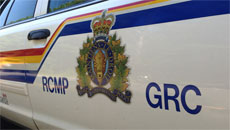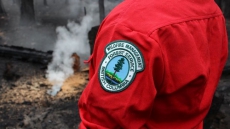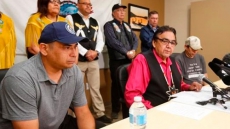OTTAWA —The Liberal government is putting the United Nations on notice that Canada is ready to provide money and, more importantly, troops for peacekeeping missions around the world.
Up to 600 Canadian soldiers — including engineers and medical units — are being committed to future peacekeeping operations, as well as equipment such as helicopters and planes, Defence Minister Harjit Sajjan and Foreign Affairs Minister Stephane Dion said Friday.
"It is time for Canada to choose engagement over isolation," Dion told a news conference in Saguenay, Que., where Liberal MPs are taking part in a two-day caucus retreat.
"(It is) time to act with responsible conviction as a determined peacebuilder."
The additional soldiers represent a dramatic increase over the 19 Canadian troops deployed on peacekeeping missions at the end of July, bringing the total more in line with the number of Canadian blue berets deployed in the 1990s and early 2000s.
Sajjan said Friday's announcement signals that Canada is committed to re-engaging in a full spectrum of multilateral peace operations, but he also warned that the landscape has changed dramatically in the last 20 years.
"Around the world, the nature of conflict is changing and it's more complex than ever," Sajjan said.
"Today, peace support operations are conducted where there may be no peace to keep, or where the fragile peace constantly teeters on the edge of violence. We need to understand conflict better. We need to look at the root cause of conflict, and think of innovative ways to move forward."
The government is also setting aside $450 million over three years for projects that promote peace and security around the world, including the deployment of police officers and civilian experts.

The UN says 75 Canadian police officers and nine military experts were participating in missions at the end of July.
The commitments are being announced in advance of a major conference in London. Countries are required to make a tangible pledge in order to attend. Canada did not attend last year's summit in Washington, which was organized by U.S. President Barack Obama.
But the big question, which the government has yet to answer, is where Canadian troops would actually end up. The government says no decision has been made, but it's believed Canada will participate in more than one country.
Speculation has been rife that the Liberals are eyeing a mission in Mali, the Central African Republic, South Sudan or the Democratic Republic of Congo. But all four represent complex and dangerous environments, with no easy solutions.
In Mali, for example, 86 peacekeepers have been killed since April 2013. The UN missions in the DRC and South Sudan, meanwhile, have been accused of not doing enough to protect civilians. The political situations in those countries are also extremely volatile.
The Liberals promised during last year's election campaign to return Canada to peacekeeping after more than a decade of dwindling participation. In July, Canada ranked 67th out of 121 nations in terms of the number of troops and police deployed on peacekeeping missions.

Some have questioned the Liberal government's emphasis on peacekeeping given that many UN missions involve dealing with terrorist groups and other non-state actors. There have also been concerns that the military, which also has a large mission in Iraq and will be soon going to Latvia, is being stretched thin.
Sajjan has said the government won't task the military with anything that commanders believe they can't handle.





